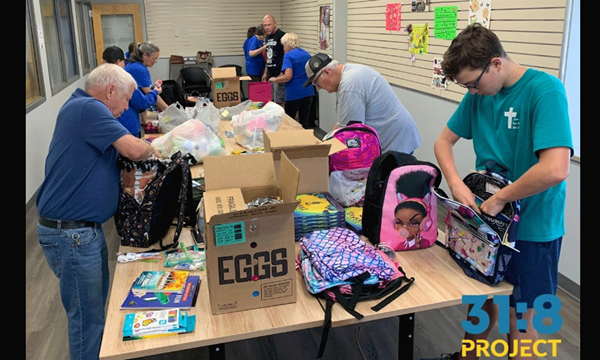"Speak out for those who cannot speak, for the rights of all the destitute." Proverbs 31:8
The 31:8 Project reaches people impacted by human trafficking in Minnesota, Montana, North Dakota, and South Dakota through education, survivor mentorship, and Bravery Backpacks.
Stacy Schaffer, executive director and founder of the 31:8 Project, was one of the speakers at the 2024 Dakotas Annual Conference.
As an undergraduate at the University of Mary in Bismarck, North Dakota, Stacy Schaffer learned about human trafficking. Growing up in Wishek, North Dakota, she had not considered the causes, impacts, and issues surrounding this crime and the victims.
In 2006, she found herself on a mission trip to Guatemala. While there, she had the opportunity to assist with a case involving an eight-year-old girl who had been trafficked.

"She was taken to a brothel and repeatedly sexually abused. Fortunately, we were able to intervene and provide her with services. This kind of assistance is very uncommon, obviously, in underdeveloped areas. She is doing well. She ended up getting married and having kids. It was a true success story. Her name is Anna. Anna is really my 'why' behind doing this work," said Stacy.
Fast-forward to 2015, when Stacy launched the 31:8 Project. The name comes from Proverbs 31:8: "Speak up for those who can't speak for themselves." The original mission was to focus on education.
How can human trafficking exist in the rural states of North and South Dakota? "We are the perfect location for human trafficking to exist," said Schaffer.
A homeland security officer validated that rural areas are prime targets for human trafficking. Traffickers like to work underground. They don't want to work in cities. They are drawn to small towns because they feel like they will not be caught. Areas that are primarily agricultural areas have a lot of farmlands, and not a lot of law enforcement or patrol, are breeding grounds for human trafficking.
Human trafficking is defined as selling someone for a good or service. It involves three elements: force, fraud, and coercion. People are trafficked for sex and labor.
"We estimate that there are more than 50 million people enslaved today. It is the second-largest criminal industry in the world and generates around $150 billion per year. The biggest question asked is, 'Why would someone want to sell a human being versus sell drugs?' You can sell them over and over again," said Schaffer.
McCabe United Methodist Church in Bismarck, North Dakota, filled bags that were delivered to victims of human trafficking.
Invite someone to speak to your congregation or small group about human trafficking. Contact the 31:8 Project.
Financial gifts made through the 2024 Miracle Offering will expand the impact of the 31:8 Project.
excerpt from a story by Doreen Gosmire, director of communications, Dakotas UMC
This story represents how United Methodist local churches through their Annual Conferences are living as Vital Congregations. A vital congregation is the body of Christ making and engaging disciples for the transformation of the world. Vital congregations are shaped by and witnessed through four focus areas: calling and shaping principled Christian leaders; creating and sustaining new places for new people; ministries with poor people and communities; and abundant health for all.





